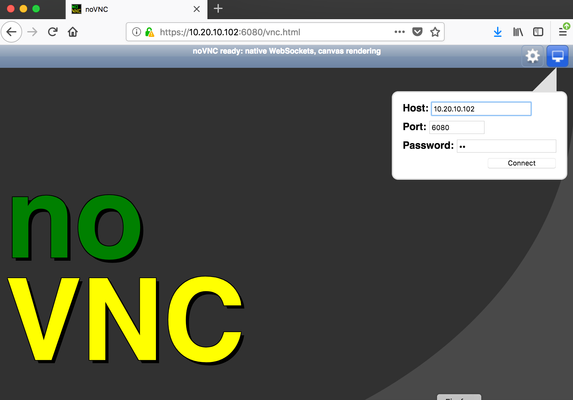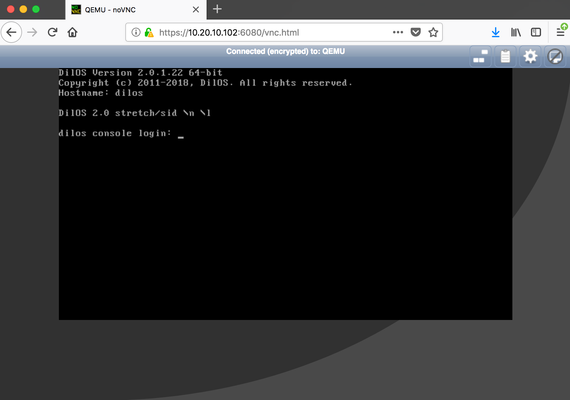How To use noVNC on DilOS
It is possible to access the VNC console form the WEB browser and without having VNC client installed. For that purpose websockify proxy is used (formerly named wsproxy) and it part of the noVNC project. At the most basic level, websockify just translates WebSockets traffic to normal socket traffic. Websockify accepts the WebSockets handshake, parses it, and then begins forwarding traffic between the client and the target in both directions.
In this example we will configure the access to qemu-kvm virtual machine console using noVNC service:
The installation procedure is quite simple:
root@dilos:~# apt -y install novnc python-websockify
root@dilos:~# openssl req -x509 -nodes -newkey rsa:2048 -keyout ~/.ssh/novnc.pem -out ~/.ssh/novnc.pem -days 365
root@dilos:~# websockify --web=/usr/share/novnc/ --cert=/root/.ssh/novnc.pem 6080 localhost:5900 -D
Where:
--web - doc root for mini-webserver in wensockify (default path is: /usr/share/novnc)
--certs - the certificates that has been generated on step 2.
6080 - points the port that is listen for incoming connections from clients
localhost:5900 - points to VNC host and port where where redirect incoming requests to
-D - to run service in a daemon mode. For testing purposes, this option can be replaced with -v option, that run instruct service to run in verbose mode and produce diagnostic output on console.
root@dilos:~# /smartdc/bin/qemu-system-x86_64 -enable-kvm -smp 4 -m 8192 \ -drive file=/dev/zvol/rdsk/rpool/kvm/con4,if=virtio,index=0,media=disk,boot=on,id=disk0 \ -bios /smartdc/share/qemu/extboot.bin -vnc 0.0.0.0:0,password -monitor stdio \ -device virtio-net-pci,netdev=n1,mac=02:08:20:80:8e:d3 \ -netdev user,id=n1,net=192.168.11.0/24
Where:
-vnc 0.0.0.0:0,password - configure VNC service listen on any host address (0.0.0.0) and port 5900 (in a format 590X, where :0 is 5900, :1 is 5901 and etc ...). Password authentification (the "password" option) must be used here as a requirement for noVNC service .
(qemu) change vnc password Password: ** (qemu)
Now you are able to connect to VNC console of the host with your browser. Open URL https://YOUR_HOST:6080/vnc.html
Enter the password we set up on previous step and you will get connected to VNC console.

